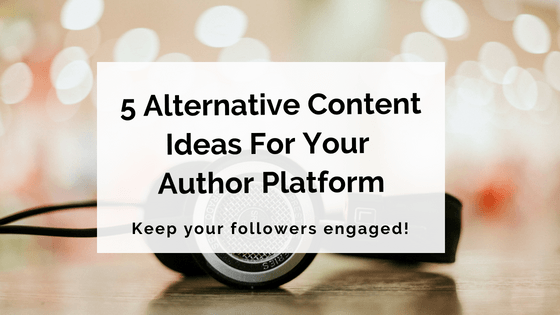For indie authors, producing content in addition to your actual books is an important component of a successful marketing strategy. But in maintaining an active online author platform, it can be all too easy to run out of ideas for fresh, engaging content.
If you already have a blog, multiple social media accounts and an author newsletter (which we think you should!), after a while, you’ll probably find yourself in search of new types of content to create for your audience.

And that’s exactly why we’re here today: to talk you through five alternative types of content to help freshen up your content strategy and provide interest and value to readers.
We’ll teach you how to use your existing platforms and channels to leverage exciting new content formats, all in the name of keeping your indie author brand active and strong.
Let’s jump right in.
1. Podcasts
Podcasts have seen an explosion in popularity in recent years. Much like audiobooks, podcasts are a popular format because they allow the listener to consume content while they go about their daily business – chores, work, driving, exercising, etc.
It might surprise you to learn that this can be a viable content format for indie authors. You might have assumed that podcasting is best left to the ‘professional podcasters’ – the likes of Serial and Stuff You Should Know.
But really, you don’t need to create a strictly structured podcast with high production values and the aim of climbing up the charts. (Though you can if you want to, of course!)
All you actually need to do is create short, clear snippets of audio content that your audience will find interesting, entertaining, useful, or all three. You don’t even have to upload them to a podcast-specific platform like Apple Podcasts – you can simply post the audio files on your website or include them as part of your author newsletter.

You can virtually talk about anything you like in your podcasts! Your writing process, your book production stages, what you’ve been reading lately… Basically, you can treat podcast episodes like audio blog posts, using the same sort of content you might usually post on your blog, just in a different format.
Let’s take a look at an indie author example.
Bestselling author and Writer’s Edit Founding Editor, Helen Scheuerer, updates her readers via mini podcasts on her blog. In each short episode, Helen chats about where she’s currently at with her writing and publishing, as well as discussing other aspects of the indie author life.
Podcast content like this is a great way to freshen up and diversify your author content strategy. Plus, since you’re literally speaking directly to your readers (and listeners), it provides them with a more personal insight into you as a person and an author.
2. Vlogs
These days, video content is bigger than ever in the book community. There have never been more book bloggers (or, we should say, ‘booktubers’) on YouTube, and videos have made their way into the content strategies of many authors, too.
Vlogging (or video blogging) is exactly what it sounds like: a version of blogging, in video rather than written format. It’s another step up from the podcasts we were just talking about; this time, your audience is seeing your face as well as hearing your voice.
This makes vlogging a little more of a personal endeavour. Many readers appreciate the opportunity to have that extra personal connection to an author whose books they are interested in. However, we understand that this option might not be preferable to every author.
Many writers tend to be the introverted type who prefer to stay behind the computer screen, rather than being featured on it! And that’s fine. If vlogging takes you a little too far out of your comfort zone, you don’t have to do it.

If you are interested in vlogging, though, the video world is your oyster. You can upload videos to a YouTube channel or directly to your author website/Facebook page, or even just take advantage of more casual video functions like Facebook Live or Instagram Stories.
In your videos, as in your podcasts and blog posts, you can really talk about whatever you like: your books, your writing process, your workspace, your general life. Just keep in mind at all times that you’re running a professional platform, and that anything you post should be in keeping with your author brand.
Many authors who choose to make videos have seen great success. Hugely popular YA author John Green, alongside his brother Hank, has hosted a vlog for over 10 years – and with over three million subscribers, it’s safe to say their channel is pretty successful!
Indie authors can be big in the vlogging world, too. Authors like Jenna Moreci have made vlogging a big part of their author platform and brand, and have seen it pay off.
3. Live Q&As
If you’re game, you can open yourself up to reader curiosity through a live Q&A session.
Static Q&As or FAQs are fairly common on author websites and blogs, but a live Q&A can shake things up a little and add some interactive excitement to your online presence.
You can do this in front of the screen, using a feature like Facebook Live or a live video on Instagram, or behind it, using something like Instagram’s ‘Questions’ function.
In mid-2018, ‘Questions’ for Instagram Stories were launched. This feature allows you to post an ‘Ask me a question’ sticker on your Story, which followers can respond directly to with their question. You can then choose to post questions and their replies as separate posts on your Story.
Authors who aren’t super comfortable answering questions on the spot on camera might prefer to utilise this function to host a Q&A session that’s still technically ‘live’, but that gives you a little more control over your response time and the questions you choose to answer.

Whichever medium you choose to deliver your Q&A, it’s a good idea to do some prep beforehand to make the process a little easier for both you and your audience.
Perhaps you’d like to narrow down questions to a specific topic area, such as the writing process, your writing routine or your publishing journey so far; make sure you specify this to your audience before the Q&A begins.
You should also specify any areas that you won’t be answering questions in regards to – for example, spoilers for upcoming books, or questions about your personal life.
You might also like to follow up your live Q&A by transcribing/collating all the questions and answers into a static blog post. That way, readers who missed out on experiencing it live can still check out the results of the session.
4. Themed blog posts
You don’t necessarily need to use an entirely new medium to shake up your author content strategy. Sometimes all it takes is revamping your existing channels with some fresh content.
Take your blog, for example. You might currently be posting a weekly or monthly update about your writing; sharing news and announcements as they occur; promoting your books; and/or posting sporadically about anything that comes to mind.
All of this, of course, is absolutely fine. But if you’re running out of content for new posts, and feeling like your blog could do with a bit of a refresher, why not try revamping your blog schedule with some regular themed posts?
This can be as simple as having set times where you post about a single theme. For example, one week of each month might be self-publishing-themed, where you discuss the steps of your indie author journey; another could be writing advice themed, where you share helpful tips for your readers; and so on.

You can also try different types of simple weekly posts, which can help you increase the frequency of your posting as well as providing variety in your content. Here are a few suggestions:
- Moodboard Monday (where you post a moodboard or ‘aesthetic’ each week relating to what you’re writing at the moment. Pinterest can help with this!)
- What I’m Reading Wednesday (where you share what you’ve been reading lately)
- Fan Art Friday (where you post fan art your readers have created for your books – check out the #fanartfriday hashtag on Instagram or Twitter to find other authors who are doing this)
- Spotify Saturday (where you share Spotify playlists of what you’re listening to – especially effective if you have tailored playlists to accompany your books or your writing process)
However you choose to go about it, the themed-post approach can provide inspiration and a useful structure for your blogging, and introduce some all-important variety to your platform.
5. Guest blog posts
We’ve talked before about why indie authors need to guest blog. But if you’d like to shake up your own author content, it’s also a good idea to reverse the process and invite guest bloggers to contribute posts for your author blog.
Guest posts provide interest and a point of difference for your blog, and have the added benefit of helping you form genuine connections and relationships with others in the industry.
If you’re invited to contribute a guest post to someone else’s blog, you can ask if they’d be interested in returning the favour for you, and vice versa – if someone writes a post for your blog, offer to write one for theirs, too.

Try reaching out to some fellow indie authors, book bloggers and other people in the writing/publishing sphere to see if they’d be interested in posting on your blog. You can also post on your website and social media letting people know that you’re open to guest post pitches.
There’s one warning we’ll provide for this type of content, though: don’t be tempted to accept any offer of a guest post just for the sake of it.
You should only accept quality guest posts for your blog – posts that are well-written, that fit in well with your own author brand, and that will provide your readers with content of value or interest.
***
Have you used any of these types of content before, or do you plan to in future? Have you seen any other fresh forms of content you think indie authors should try out?
Let us know in the comments below!